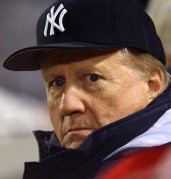
New York Yankees icon George Steinbrenner III was an oxymoron: abrasive and gentle, annoying and delightful, mean and kind. All those adjectives applied to the man who surly earned the nickname “The Boss.”
He was also given the negative nickname “Manager George” for his tendency to meddle in daily on-field decisions, and to hire and fire managers. His outspokenness and larger than life role in driving up player salaries made him one of sports’ most controversial figures.
Out of all the stories that have surfaced since his passing on the morning of the 81st All-Star Game after suffering a heart attack in his Tampa home, his relationship with African-American basketball Hall of Famer coach John McLendon is one that most skipped or missed.
When Don King brought McLendon to Las Vegas for a Mike Tyson fight, I was told to interview him. I had always thought that Will Robinson was the true pioneer in the coaching fraternity, and he is one, but I found out during that weekend that McLendon was one-of-a-kind.
During our many sessions together that Las Vegas weekend, I came to the realization that McLendon was the most influential African-American coach in this country. As he and I talked, Steinbrenner’s name jumped into the conversation.
It turns out before Steinbrenner took ownership of the Yankees in 1973, he had already expanded himself as more than a Cleveland Great Lakes shipping magnate. In 1960, against his father’s wishes, Steinbrenner entered the sports franchise business for the first time with basketball’s Cleveland Pipers. The American Basketball League was founded by Harlem Globetrotters owner Abe Saperstein. Steinbrenner joined the new basketball circuit and went on a search for a head coach.
McLendon told me that Steinbrenner told him he was looking for a big-name coach, but he would check into his background. McLendon said Pipers general manager Mike Cleary was a basketball man and was in his corner.
“After Cleary told George to ask around about me,” McLendon said, “George then got scared that I was too big.”
McLendon, who is known as the father of international basketball, told me Steinbrenner came back to him and was worried that his international travels and his conducting clinics throughout the country would take him away from bonding with the Cleveland community.
“Before we agreed formally that I would be coach,” McLendon said, “I had to prove to him that I was committed to Cleveland. So I accepted a job with the Cleveland Parks and Recreation, agreeing to conduct clinics throughout the city.
George hired me and I became the first Black to coach a professional basketball team in 1961.”
McLendon, being a cool, calm, collected and professional man, was one of the first coaches to endure the gruff personality that would later characterize Steinbrenner.
In our interview McLendon said he and Steinbrenner got along just fine and that they remained friends long after their basketball union made history. McLendon brought in several of his star players from Tennessee State, such as John Barnhill and Ben Warley, and they helped him win the ABL first half division title.
But when Steinbrenner held back the team’s pay checks, the team threatened to boycott. In McLendon’s biography, “Breaking Through: John B. McLendon, Basketball Legend and Civil Rights Pioneer” by Milton S. Katz, the author recounts how Coach went public with the players’ complaints and all hell broke loose.
Katz wrote that Steinbrenner made the players retract their complaints to the press in a written statement. McLendon resigned on moral grounds that he could not lie about what happened. Steinbrenner then hired former Boston Celtics star and Lakers’ Hall of Fame coach Bill Sharman.
Due to the outcry, Steinbrenner brought McLendon back as vice president of Basketball, thus becoming the first Black professional basketball executive. The team and league folded the next year after a merger with the NBA fell through.
McLendon, who studied in the 1930s at the University of Kansas, learning the game from the sport’s inventor, Dr. James Naismith, was not allowed to play because of segregation. In fact, UK would not suit up its first Black player until 1951.
Leland Stein can be reached at [email protected].